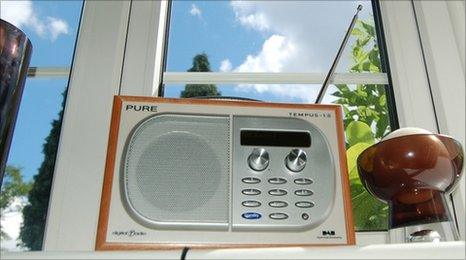The long, slow birth of DAB radio
- Published

A push is underway to get listeners to switch from analogue to DAB digital radio, but the technology is almost 30 years old. Why did it take so long to reach the airwaves?
It has been heralded as the medium of future, the means by which we will listen to the Terry Wogans and Chris Moyleses of tomorrow.
Communications minister Ed Vaizey has launched an action plan to get listeners to switch from AM and FM to Digital Audio Broadcasting (DAB) radio, promising that the public will adopt "multi-channel national radio in exactly the same way that television viewers have seen such benefits".
But although the format is not projected to win over a majority of Britons for several years to come, its genesis stretches back further than you may imagine.
One curious feature of the DAB story is that it was an invention not of the naughties, nor even the nineties - but was first pioneered as far back as 1981.
The technology began development at the Institut für Rundfunktechnik in Munich and throughout the decade was the focus of the Europe-wide Eureka 147 research project.
But the first commercial DAB receivers were not available in the UK until 1999 - begging the question: what took them so long?
The format is, after all, only now beginning to catch on in the UK - more than a decade after its public launch.
Figures from Rajar show that, in March 2010, 24% of all radio listening was digital, compared with 66% on AM or FM radio - a rise of 20% compared with the same period in 2009.
The remainder listen to radio via the internet, digital television and other outlets.
Independent radio analyst Grant Goddard believes that if there had been significant consumer take-up of DAB in the 1990s, it could by now have become the dominant format.
He argues that the fact it was developed by a multitude of European governments and state broadcasters, such as the BBC, via Eureka 147 rather than by the private sector was a crucial factor in delaying its launch.
"If Nokia develop something, they'll be bringing out the handsets before you know it," he says.
"Because DAB was a pan-European development, you had to have agreement from all sides before you could do anything. That meant progress was extremely slow."
But this alone did not account for the hold-up. The sheer complexity of introducing and regulating the system was also a major factor, Mr Goddard adds.
Exaggerated
"Each country had to then implement legislation for the spectrum to be used by DAB , because you didn't have a pan-European system," he adds.
"Then, each media regulator had to find ways to licence the spectrum. It was a hugely complicated undertaking."
As a result, Mr Goddard suspects that DAB's time may have passed before it even arrived, with other forms of digital technology - such as broadband - allowing listeners to access radio on their laptops and phones.
But Paul Donovan, radio critic of the Sunday Times and a strong supporter of DAB, believes its tipping point in public popularity cannot be too far off.
He blames a failure of manufacturers and broadcasters to collaborate effectively - the BBC began broadcasting DAB in 1995, he points out, but sets were not commercially available for another four years.
"The initial claims for DAB were exaggerated - for instance, it was said that it could provide CD-quality sound, which it doesn't," he says. "This affected the public's perception.
"But look at the success of 6 Music and BBC 7 - this is clearly something that people want. As coverage extends people more people will buy into it. And it's with car radios that DAB really comes into its own."
DAB advocates say it is on the road that the format's self-tuning properties are best showcased, and the government says it is working with car manufacturers to make digital radios standard in cars by 2013. Additionally, the BBC says it will improve in-car reception by placing more transmitters near major motorway networks as part of a programme to increase UK coverage from 85 to 92%.
The new government, however, has rowed back on its predecessor's target to switch off analogue by the middle of the decade, with Mr Vaizey promising that if people are still listening to, say, the BBC on FM by 2015, then that "will continue".
Whether DAB turns out to be the future, as Paul Donovan expects, or is already part of the past, as Grant Goddard argues, it has already consumed a sizeable chunk of broadcasting history.